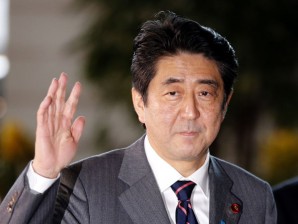Japan defends PM aide’s surprise North Korea trip
TOKYO – A Japanese minister Sunday defended a surprise visit to North Korea by one of the prime minister’s aides which Washington and Seoul said could not help efforts to forge a united front against Pyongyang.
Akira Amari, state minister of economic revitalization, said the four-day trip by Isao Iijima reflected Prime Minister Shinzo Abe’s resolve to have North Korea come clean on its kidnapping of Japanese nationals in the 1970s and 1980s.
“Japan has an extremely important case, the abduction issue, which is separate from interests of other countries,” Akira Amari, the state minister of economic revitalization, said in a talk show on public broadcaster NHK.
“This is an area in which Japan should act on its own initiative,” he added.
“When he formed a cabinet (in December), Prime Minister Abe expressed his resolve to move the abduction issue forward by himself, even by just one step or two steps.”
In 2002, North Korea officially admitted to the abductions but its refusal to give a fuller account of the cases has infuriated Japan and derailed talks to improve relations.
Iijima returned home on Saturday after fuelling speculation Pyongyang was trying to cozy up to Tokyo at a time when ties with Washington and Seoul have gone into deep freeze over its nuclear and missile ambitions.
South Korea dubbed the trip “unhelpful” to international efforts to forge a united front against Pyongyang.
Glyn Davies, the US special representative for North Korea policy, initially expressed surprise on Tuesday by saying Iijima’s trip was “news” to him.
Davies was visiting Seoul, the first leg of his tour which later took him to Beijing and Tokyo for talks with government officials there.
“We knew that North Korea would eventually shift their strategy to that of seeking engagement in an effort to split us and to exploit any differences in our respective national positions,” Davies told reporters on Saturday at the end of his stay in Tokyo.
Davies, however, said he was confident Tokyo was “fully aware of the challenges and pitfalls of engaging North Korea.”
Iijima told North Korean officials that Tokyo “would not make any move” unless they return all Japanese kidnap victims, hand over the kidnappers and resolve all the abduction cases, according to Japanese media citing sources close to him.
Iijima was a senior aide to Junichiro Koizumi who visited Pyongyang in 2002 and 2004 as Japan’s prime minister for talks with then-North Korean leader Kim Jong-Il.
During Koizumi’s 2002 trip, North Korea admitted its agents kidnapped Japanese nationals in Cold War years to train spies in Japanese language and customs.
Several of those snatched were allowed to return to Japan along with children who were born in the North, but Pyongyang said the rest of them had died, although many in Japan were not convinced.















